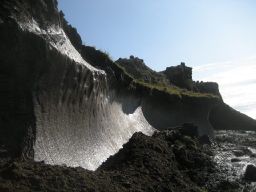
Nature itself can be the best defense against climate change for many species — at least in the short term — according to a study published in the journal Ecology Letters…

Heat from the friction of rocks caused by tidal forces could be the “engine” for the hydrothermal activity on Saturn's moon Enceladus. This presupposes that…

Permafrost makes up a quarter of the landmass in the Northern Hemisphere. Climate change means that Arctic coasts are thawing and eroding at an ever greater…

Hot vents in the deep sea and geysers on land document the penetration of water into the hot interior of the Earth. This happens primarily in regions where the…

Understanding the oceans, which cover two thirds of the Earth's surface and contain information about climate, the history of our planet and yet-to-be-explored…

A research team led by The University of Texas at Austin Jackson School of Geosciences took to the lab to recreate the magmatic melt that once formed the lunar…